Physical Address
304 North Cardinal St.
Dorchester Center, MA 02124
Physical Address
304 North Cardinal St.
Dorchester Center, MA 02124
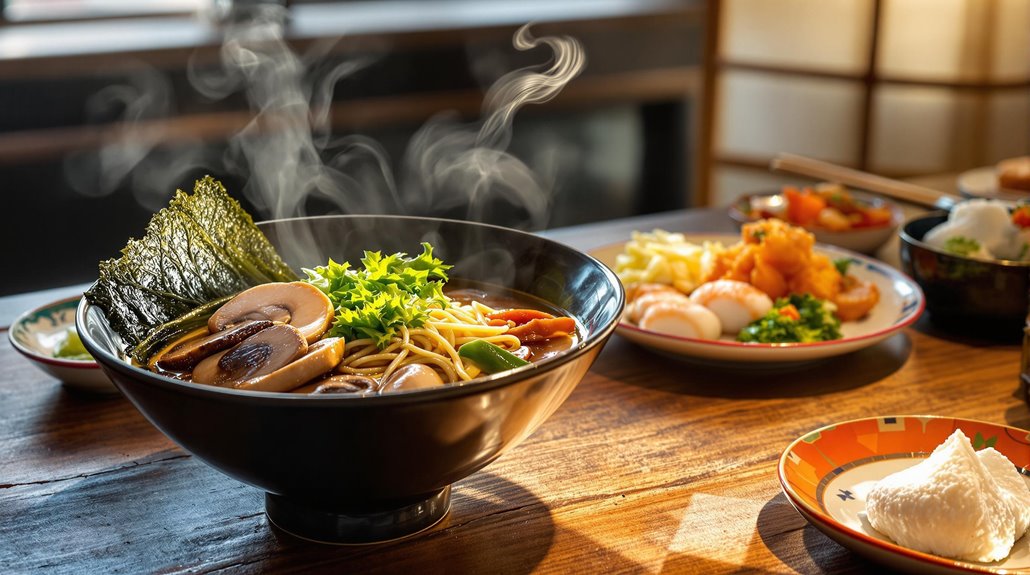
Tokyo’s vegan scene offers plenty of delicious plant-based options that won’t break the bank. You’ll find dedicated vegan restaurants like T’s Tantan for ramen and Ain Soph Ripple for burgers, plus budget-friendly convenience store staples like umeboshi onigiri. Learn key phrases like “Watashi wa bīgan desu” (I am vegan) and “Dashi wa haitteimasu ka?” (Does this contain fish broth) to navigate menus easily. This vibrant city holds countless more meat-free treasures for you to discover.
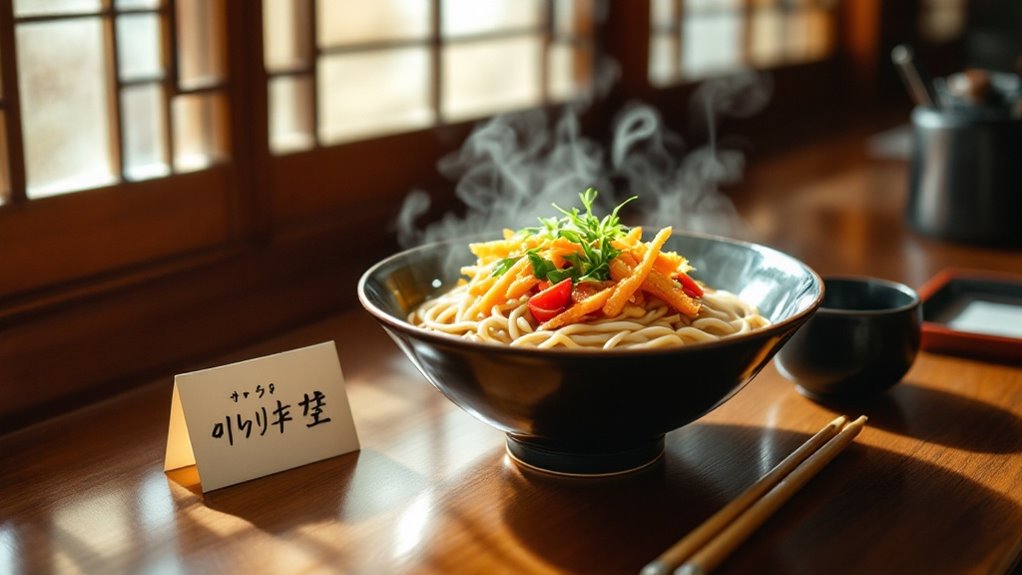
When exploring Tokyo’s dining scene as a vegan, mastering a few essential Japanese phrases can make the difference between a frustrating and fulfilling experience.
Start with basic self-identification: “Watashi wa bīgan desu” (I am vegan) or “Watashi wa niku o tabemasen” (I don’t eat meat).
To check ingredients, you’ll want to ask “Kore wa niku ga haitte imasu ka?” (Does this contain meat?) and “Dashi wa haitteimasu ka?” (Does this contain fish broth?).
For modifications, try “Oniku nashi de tsukutte itadakemasen ka?” (Could you prepare this without meat?) or request “Dashi no kawari ni konbu dashi o tsukatte kudasai” (Please use kelp broth instead of fish broth).
Remember to bow slightly when making requests to show respect for local customs. The VegeProject label can help identify restaurants that are familiar with vegan dietary needs and these phrases.
Looking to discover Tokyo’s best vegan hotspots? From traditional Japanese cuisine to international comfort food, Tokyo’s vegan scene has exploded with options.
Head to Saido in Jiyugaoka for authentic multi-course Japanese meals, featuring plant-based sushi and tempura. For ramen lovers, T’s Tantan in Tokyo Station serves creamy sesame-based broths with soy-meat gyoza.
Traditional Japanese dining meets plant-based innovation at Saido and T’s Tantan, where vegan sushi and creamy ramen await curious foodies.
Craving Western comfort food? Try Ain Soph Ripple in Shinjuku for burgers and mac ‘n cheese, or grab a late-night burrito at HIDEOUT in Shibuya. With nearly 800 vegan-friendly restaurants across the city, you’ll never run out of dining options.
Don’t miss Universal Bakes Nicome in Shimokitazawa for fresh pastries, or BiOcafe Shibuya for organic salads and gluten-free options.
Budget-conscious travelers should check out Sushi Daidokoya in Shibuya for affordable vegan maki rolls and inari.
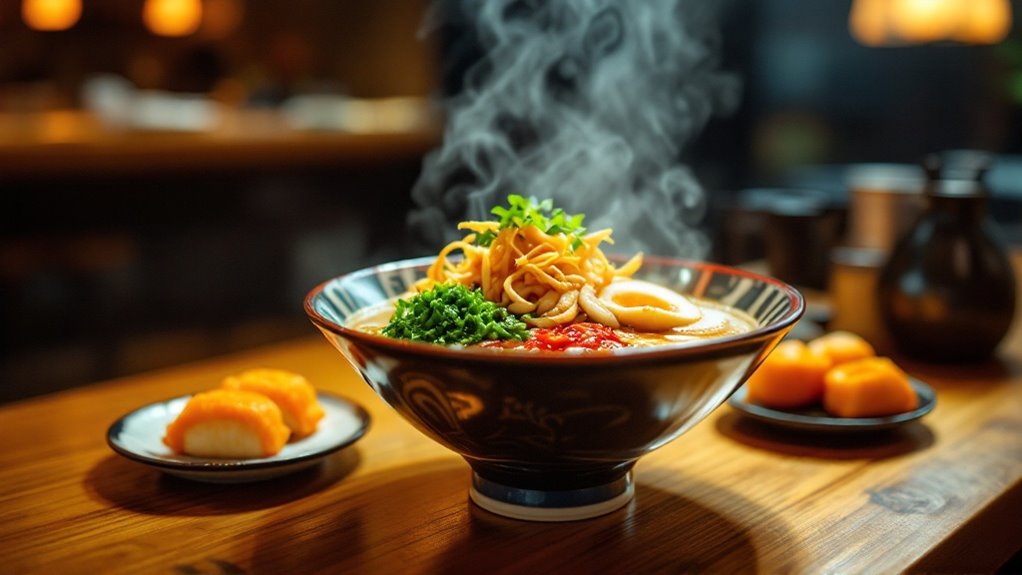
While traditional Japanese cuisine may seem challenging for vegans, understanding a few key ingredients and phrases can help you navigate the menu successfully. Be especially mindful of dashi, a common soup stock made with bonito flakes, and watch out for hidden ingredients like fish sauce or katsuobushi toppings. You can make delicious vegan dashi at home using dried shiitake mushrooms for that essential umami flavor.
You’ll find several naturally vegan-friendly options and easy modifications:
Learn essential phrases like “Dashi wa haitte imasuka?” to ask about fish stock, and consider carrying a vegan dietary card in Japanese.
For convenience store runs, stick to clearly labeled items and use translation apps to check ingredients.
Hungry vegans exploring Tokyo’s bustling streets needn’t worry about finding quick, affordable meals.
You’ll discover plant-based versions of classic Japanese street foods, from mushroom-filled gyoza to tofu takoyaki, especially in areas like Shibuya and Shinjuku.
For ultra-budget options, head to convenience stores for umeboshi onigiri (¥150-200) or grab Doutor’s soy patty burger for just ¥360.
Food courts offer excellent value too – try T’s Tantan’s ¥980 ramen bowls at Tokyo Station or 2foods’ fusion dishes under ¥1,000 at Yaesu Underground Mall.
Street festival stalls often serve vegan okonomiyaki loaded with cabbage and tempura scraps, while Falafel Brothers offers half-size pitas for ¥500 in multiple locations.
Many local ramen shops now cater to plant-based diets with their seaweed-based broths, offering a traditional taste without animal products.
Don’t miss the dairy-free taiyaki pastries filled with red bean paste from specialty vendors.
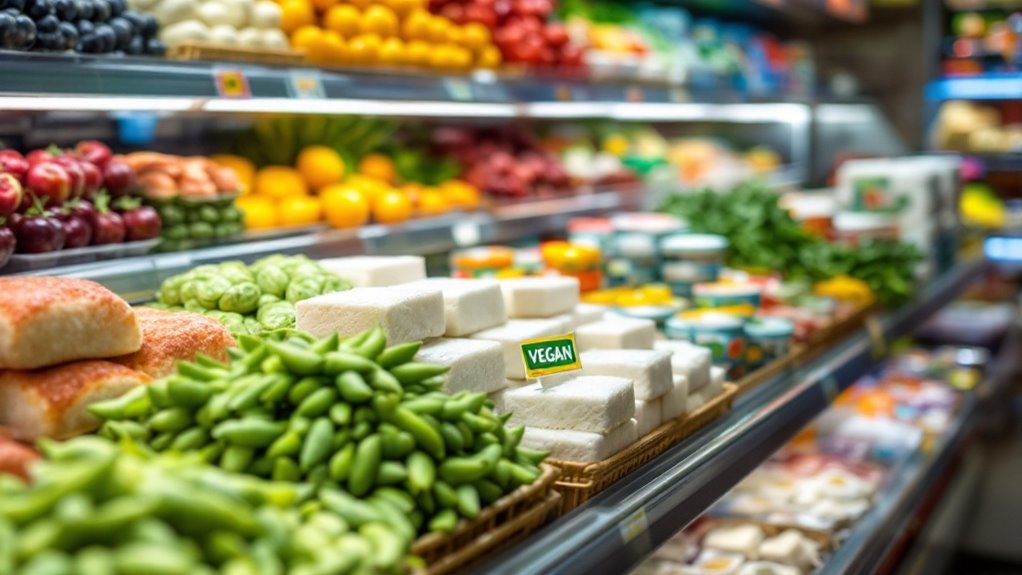
You’ll find basic vegan staples like onigiri, fresh fruits, and tofu dishes at major convenience store chains across Tokyo, though you’ll need to carefully check labels for hidden animal ingredients.
Natural Lawson is distinguished as your best bet for clearly marked vegan options, stocking Beyond Tofu products and imported plant-based milks. For convenient daily shopping, consider visiting the affiliated online mall that connects small vegan shops throughout Japan.
International supermarkets like Bio c’Bon and National Azabu offer wider selections of vegan specialty items, but expect to pay premium prices for imported brands.
Tokyo’s convenience stores and supermarkets offer numerous vegan staples that make plant-based eating surprisingly accessible.
You’ll find traditional Japanese ingredients that naturally align with a vegan diet in virtually every store, from neighborhood shops to major chains. Bio c’Bon features a dedicated bulk-food section perfect for stocking up on dried fruits and nuts.
Essential vegan staples you can count on:
For imported items, head to Natural Lawson, Bio c’Bon, or National Azabu where you’ll find Western vegan essentials like plant milks, dairy-free cheeses, and meat alternatives.
These specialty items cost more, but traditional Japanese vegan staples remain budget-friendly and widely available.
While traversing Japanese food labels can seem intimidating at first, understanding a few key characters and shopping strategies will help you confidently identify vegan products.
Watch out for common animal-derived ingredients like egg powder (全卵粉末), milk powder (全粉乳), and gelatin (ゼラチン). Check allergen warnings for eggs (卵) and milk (乳). Fish-based dashi (出汁) and honey (はちみつ) are frequently hidden ingredients you’ll need to spot. Some ingredients can be highly processed ingredients that make their original source difficult to identify.
For easy shopping, start at Natural Lawson’s plant-based section or Life supermarket’s dedicated vegan areas. You’ll find accidentally vegan onigiri at most konbini, particularly with seaweed or umeboshi fillings.
Use apps like IsItVeganJapan.com or HappyCow to verify products, and don’t hesitate to scan QR codes for detailed digital ingredient lists.
Steering through Tokyo’s food scene as a vegan requires staying alert to hidden animal ingredients that lurk in seemingly vegetable-based dishes.
When dining out, be especially cautious of ramen, as the broth is typically pork-based, even if you’re ordering a vegetable topping.
Watch out for these common non-vegan ingredients:
You’ll need to specifically request vegan alternatives or look for restaurants that clearly advertise vegan options.
Many traditional Japanese dishes can be modified to be vegan-friendly, but you’ll need to communicate your dietary requirements clearly and double-check ingredients with staff.
Be particularly mindful of miso soup, which is often prepared with fish-based dashi despite its vegetable-like appearance.
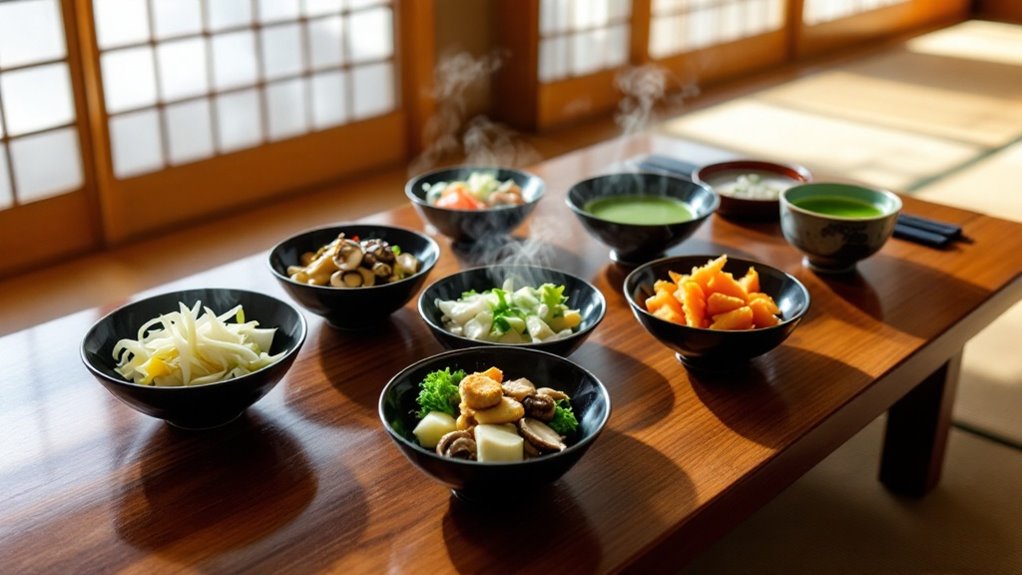
One of Tokyo’s most authentic vegan experiences awaits in its Buddhist temples, where shojin ryori (Buddhist temple cuisine) has been perfected since the 13th century. This strictly plant-based cuisine emphasizes seasonal ingredients and balances five essential flavors while avoiding meat, fish, eggs, dairy, garlic, and onions.
Shojin ryori offers a centuries-old vegan tradition within Tokyo’s temples, crafting pure plant-based cuisine that harmonizes seasonal flavors.
You’ll find masterfully prepared tofu variations, foraged mountain vegetables, and soybean-based proteins seasoned simply with miso or konbu dashi. The tradition was introduced by Dogen monk who brought these culinary practices from China.
For an immersive experience, head to Sankouin Temple in Koganei, where Chef Kōshin Nishii serves signature smoked tofu in multi-course meals. While premium experiences start at ¥28,000, you can also explore more affordable options through guided vegan food tours.
Remember to book well in advance, arrive on time, and consider combining your meal with meditation sessions or temple garden tours.
Maneuvering Tokyo’s vegan scene has never been easier thanks to an array of digital tools and community resources. The HappyCow app ($3.99) grants access to over 900 vegan-friendly restaurants, while the free Vegewel website offers extensive filtering options for dietary preferences. Google Maps’ real-time “vegan” searches help you find what’s open nearby. Since options are more limited outside Tokyo, it’s wise to keep snacks as alternatives.
Essential apps for decoding ingredients include:
For offline backup, download VegeMap’s paper guides and save key Japanese phrases like “Katsuobushi wa haitte imasu ka?” to check for fish flakes.
Join the Tokyo Vegan Meetup community for pop-up events and local restaurant recommendations.

While Tokyo’s vastness can seem intimidating, several neighborhoods stand out as vegan hotspots with high concentrations of plant-based eateries.
Shibuya leads the pack with iconic spots like Ain Soph Ripple for burgers and Nagi Shokudo for traditional Japanese fare.
Hip Shimokitazawa offers Universal Bakes Nicome’s fresh pastries and Chabuzen’s hearty ramen.
Shinjuku caters to plant-based diners with Plant Based Tokyo and numerous innovative eateries near the station area.
Nakameguro delivers international flavors through Ballon TOKYO’s falafel and Alaska zwei’s café offerings.
For a quieter vibe, Jiyugaoka features T’s Tantan’s flagship location and several cozy cafés, where you can try their famous golden sesame peanut ramen.
Each neighborhood brings its own character to Tokyo’s thriving vegan scene, making plant-based dining accessible across the city.
Beyond Tokyo’s vegan-friendly neighborhoods, the city’s culinary landscape transforms with each passing season.
You’ll find local produce shaping traditional dishes at spots like Saido and Noeud.Tokyo, where chefs craft innovative plant-based meals using regional ingredients. For convenient shopping, Natural Lawson stores offer ready-to-eat vegan curry and other plant-based options.
Key seasonal highlights include:
Shop smart by visiting farmers’ markets in Kichijoji and Meguro for organic vegetables, or check AEON supermarkets for clearly labeled regional produce.
Don’t miss the depachika basement food halls for seasonal vegan bento boxes featuring mountain vegetables and preserved local fruits.
Tokyo’s vegan scene unfolds like a blooming cherry blossom – once hard to find but now flourishing everywhere you look. You’ll discover that eating plant-based in Japan’s capital doesn’t have to break the bank or leave you hungry. From convenience store onigiri to temple cuisine, you’ve got plenty of options. Armed with these tips and resources, you’re ready to explore Tokyo’s growing vegan landscape confidently.